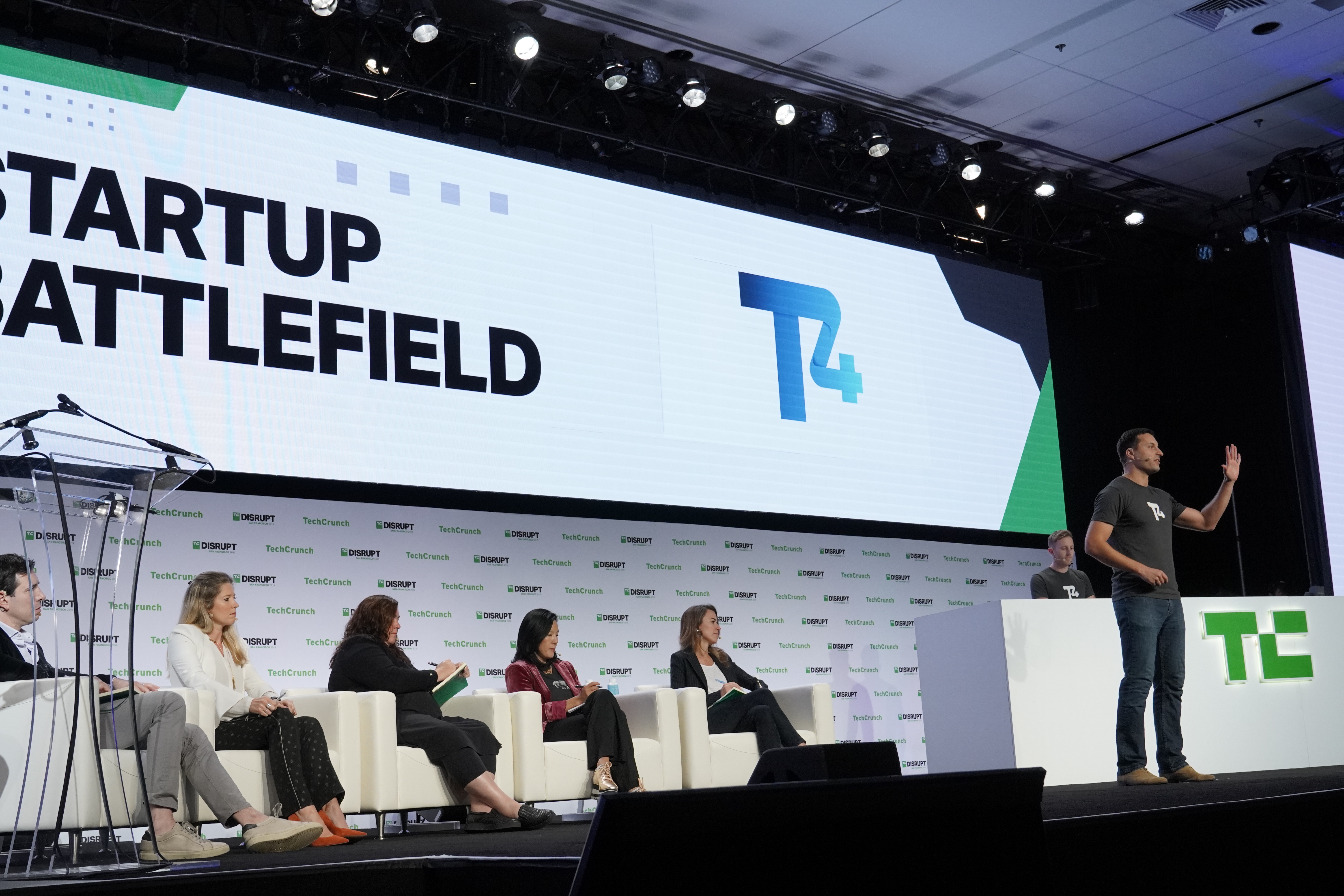Music
Trailers
DailyVideos
India
Pakistan
Afghanistan
Bangladesh
Srilanka
Nepal
Thailand
StockMarket
Business
Technology
Startup
Trending Videos
Coupons
Football
Search
Download App in Playstore
Download App
Best Collections
Technology
When T4 co-founder and CEO Maks Khurgin was working at Bain and Company, he ran into a common problem for analysts looking for market data. He spent way too much time searching for it and felt there had to be a better way. He decided to build a centralized market data platform himself, and T4 was born. This week the company competes in the TechCrunch Disrupt SF Startup Battlefield.
What he created with the help of his long-time friend and CTO, Yev Spektor, was built on a couple of key components. The first is an industry classification system, a taxonomy, that organizes markets by industries and sub-industries. Using search and aggregation tools powered by artificial intelligence, it scours the web looking for information sources that match their taxonomy labels.
As they researched the tool, the founders realized that the AI could only get them so far. There were always pieces that it missed. So they built a second part to provide a way for human indexers to fill in those missing parts to offer as comprehensive a list of sources as possible.
&AI alone cannot solve this problem. If we bring people into this and avoid the last mile delivery problem, then you can actually start organizing this information in a much better way than anyone else had ever done,& Khurgin explained.
It seems simple enough, but ita problem that well-heeled companies like Bain have been trying to solve for years, and there was a lot of skepticism when Khurgin told his superiors he was leaving to build a product to solve this problem. &I had a partner at Bain and Company actually tell me, &You know, every consulting firm has tried to do something like this — and they failed. Why do you think you can do this?&&
He knew that figuring out the nature of the problem and why the other attempts had failed was the key to solving the puzzle. He decided to take the challenge, and on his 30th birthday, he quit his job at Bain and started T4 the next day — without a product yet, mind you.
This was not the first time he had left a high-paying job to try something unconventional. &Last time I left a high paying job, actually after undergrad, I was a commodities derivatives trader for a financial [services company]. I left that to pursue a lifelong dream of being in the Marine Corps,& Khurgin said.

T4 was probably a less risky proposition, but it still took a leap of faith that only a startup founder can understand, who believes in his idea. &I felt the problem first-hand, and the the big kind of realization that I had was that there is actually a finite amount of information out there. Market research is created by humans, and you don&t necessarily have to take a pure AI approach,& he said.
The product searches for all of the related information on a topic, finds all of the data related to a category and places it in an index. Users can search by topic and find all of the free and paid reports related to that search. The product shows which reports are free and which will cost you money, and like Google, you get a title and a brief summary.
The company is just getting started with five main market categories so far, including cloud computing, cybersecurity, networking, data centers and eSports. The founders plan to add additional categories over time, and have a bold goal for the future.
&Our long-term vision is that we become your one-stop shop to find market research in the same way that if you need to buy something, you go to Amazon, or you need financial data, you go on Bloomberg or Thomson. If you need market research, our vision is that T4 is the place that you go,& Khurgin said.
- Details
- Category: Technology
Read more: T4 wants to transform market research data with a combination of AI and humans
Write comment (99 Comments)Nonprofits employ 10% of the U.S. workforce and generate some $2 trillion in revenue each year and yet, many charitable organizations are still using pen and paper to track their volunteers.
Civic Champs, a startup that presented onstage at TechCrunch Disrupt SF, has developed a platform that aims to give non-profits the tech tools they need to better manage volunteers.
&The nonprofit market is underserved by technology companies,& co-founder and CTO Mike Jeffery told TechCrunch.
Civic Champs is initially focusing on volunteer management. However, the mobile app, which was built with React Native for Android and iOS, can be broadened over time.
For instance, the company recently launched a micro-donations feature that automatically converts volunteers to donors. The feature will integrate a number of payment options, including Stripe, Apple Pay, and Plaid/Dwolla for ACH donations.
The Civic Champs platform uses geolocation and geofences to automate volunteer-hour tracking. The seemingly simple task of checking volunteers into events and tracking their time can take a small nonprofit 10 hours per month to manage, according to the company. Civic Champs co-founder and CEO Geng Wang says their platform can slash that task down to an hour per month.
Civic Champs designed a mobile-first platform. However, the companyco-founders say they understood that not all volunteers will have smartphones or want to use the app. So they developed three ways to use the platform.
Volunteers can use the Civic Champs mobile app to check in at events and track their hours. The platform has also been adapted to web-based kiosks, which nonprofits can use to make it easier for tech-averse volunteers to check in. A volunteerhours can also be tracked through a nonprofitadministrative features on both the app and the web. All three tracking methods — mobile, web kiosk, or by administrator — synchronize volunteer tracking across platforms and between users and potentially multiple organizations.
With the launch of Civic Champs, Wang, who co-founded the startup with Jeffery and Ryan Underdahl, is now solidly in serial entrepreneur territory. Wangfirst startup, RentJungle, was an apartment search engine, which was acquired in 2014 by The Rainmaker Group. Wangsecond startup, a social media marketing firm called Community Elf that has since been rebranded as Cosmitto, was acquired in 2017 by private equity firm Topanga Partners.
For his third go around, Wang told TechCrunch he wanted to do something more mission-driven. The original idea was to create a mobile game for volunteering. This &Pokemon Go& of volunteering would let users contribute in small ways — like helping cities collect data on physical assets, such as traffic lights and fire hydrants using GPS and photo uploads.
But that idea quickly morphed into something larger when Geng started talking to volunteer organizations and learned the challenges were far more basic and widespread.
&Essentially, nine out of the 10 organizations we talked to still track their volunteers on pen and paper forms,& Geng said. &As a former consultant, I thought well thatsort of crazy. Thata lot of time that you&re spending on paperwork that you could direct back to the community and in certain, more impactful ways.&
The co-founders pivoted away from gamification and started developing a mobile platform that nonprofits can use to track volunteers. The company officially launched in January 2019.
Civic Champs has raised $312,000 in a pre-seed round and also received $29,000 in non-dilutive grants through the Indiana University CLAPP competition and the Indiana Technical Assistance Program.
The company is still figuring out its pricing structure. Civic Champs does have 34 customers, 24 of which are paid clients. The remaining 10 are pilots. The business model, which is set up like a Software-as-a-Service product, charges between $25 a month for its smallest customer up to $450 a month for its largest client.
- Details
- Category: Technology
Read more: Civic Champs app gives nonprofits the tech tools to manage volunteers
Write comment (91 Comments)The founders of Vise AI met when they were 13, a couple of teenagers more interested in applied artificial intelligence than English class. Fast-forward several years and the pair has relocated from the Midwest to San Francisco to raise money for a financial technology business they&ve been self-funding since 2016.
As teenagers with an inordinate amount of AI knowledge, Samir Vasavada and Runik Mehrotra proved to be quite useful to large businesses, investment bankers and other financiers. Leveraging their AI know-how, they were paid $700 per hour by a consulting firm to teach financial &experts& about AI. Mehrotra, according to Vasavada, is a mathematical prodigy: &And that translates extremely well to AI, right, because what underlies AI is math,& Vasavada, co-founder and chief executive officer of Vise AI, tells TechCrunch. &We had the ability of articulating what AI is to investment bankers in a way that they would understand. Whereas most expert explanations would be really complex and very technical.&
Meanwhile, school was on autopilot. &I was taking phone calls in English class,& Vasavada said. &It wasn&t very good but we were making a lot of money.& Ultimately, that money funneled into the early makings of a real business, Vise AI, which automates portfolio management using AI and machine learning. Launching onstage at TechCrunch Disrupt San Francisco today, the SEC-registered investment advisor will begin customer on-boarding next week. In short, the platform analyzes clients& investment needs and builds them a personalized portfolio of stocks, bonds and other assets, then provides investment manager tools to automate management.
&Itan unsexy industry that makes all of the money in finance,& said Mehrotra, co-founder and chief technology officer of Vise AI.
For now, the team is going after independent advisory shops, those without a flock of analysts available at their beck and call and who need outsourced investment management. Ultimately, they plan to pursue the big wealth managers. The business has also been approved as a subadvisor by TD Ameritrade Institutional, which has thousands of independent RIAs on its platform.
&The icing on the cake is what we refer to as portfolio intelligence,& Vasavada explains. &We can provide unique insights, justifications and logic as to why specific investment decisions were made — talking points to make the advisor look smarter with the clients because ita relationship game with these advisors, so tools that will help build their relationships and help empower their relationships, while still delivering a better portfolio to the client is the type of solution that really needs to be built in this space.&
&We are literally giving them bite-sized portfolio intelligence,& adds Mehrotra. &Because most of them aren&t really doing the investment management themselves, right? So they&re either using some ETF allocation tool, like Betterment for Advisors, or something like that, where itjust a standard set of ETFs and there really isn&t any personalization.&
We felt like we were turning away tons of money. Vise AI co-founder Samir Vasavada
Vasavada, hailing from Cleveland, and Mehrotra, raised just outside Detroit, met years ago at a Northwestern University summer research program. The two have since established themselves as AI experts, supporting high-profile clients (who they can&t name due to non-disclosure agreements) as consultants and completing the fintech conference circuit a few times over. But when it came to raising venture capital to exit the era of self-funding and launch their AI-enabled portfolio manager, they were clueless.
Their first infusion of outside capital came in the form of a $20,000 uncapped note from Dorm Room Fund. A little something to help them through the daunting fundraising process. But their first real pitch meeting was with none other than Vinod Khosla, the billionaire founder of Sun Microsystems and Khosla Ventures. Khoslason, Neal Khosla, had worked on the investment team at Dorm Room Fund and made the introduction.
Khosla passed and the Vise team realized they had no idea what they were doing. They began refining their pitch. After reaching out to roughly 1,000 different investors (Vasavada created a detailed CRM to track all their cold pitches) they raised $2 million from co-leads Keith Rabois, a co-founder at PayPal and a partner at Founders Fund, and Ben Ling of Bling Capital, two investors who were, ironically, former general partners at Khosla Ventures. Great Oaks Ventures, Flatiron Health co-founders Nat Turner and Zach Weinberg, Future Advisor founder John Xu, NFXPete Flint and Contrary Capital also participated. Vasavada and Mehrotra said that once they had tapped two high-profile leads, offers came flooding in, including from VCs who had rejected them just weeks before.
&This was our first round of fundraising ever,& says Mehrotra. &So in the beginning, a lot of it was just like, figuring out how things worked and learning how to best pitch the company because it is a niche market. I think once we got the momentum … We felt like we were turning away tons of money.&
We want to empower advisors to be better at their jobs. Vise AI co-founder Runik Mehrotra
Once they reach $50 million in assets under management, Vise plans to raise a much larger round of funding to help the team expand and open an office in New York.
Vise is targeting a market worth trillions in one of the most valuable industries in the world. To succeed in the long term, the startup will have to infiltrate a decades-old network relying on legacy technology, as well as battle Silicon Valleynarrative that robo-advisors will soon make the financial advisory space obsolete. According to their thesis, companies like Betterment and Wealthfront are successful with tech-rich millennials, but once one accumulates &real wealth,& ita conversation with a human being they&re looking for, not an easy-to-use app.
&We want to empower advisors to be better at their jobs, so they can focus on actually building better relationships and holding their clients& hand,& said Mehrotra.
- Details
- Category: Technology
Read more: Meet Vise AI, the startup reimagining portfolio management
Write comment (96 Comments)
If it ain't broke, don't fix it: so the age-old adage goes, and the Sony Alpha A9 was practically perfect when it launched in April 2017. But age eventually catches up with all things and Sony snapper fans have been quietly clamoring for an updated version of the company's pro-level full-frame mirrorless sports camera.
Today, the Japanese
- Details
- Category: Technology
Read more: Sony's electrifying Alpha A9 II full-frame mirrorless just launched out of nowhere
Write comment (90 Comments)

In the race to build better and better true wireless headphones, LG might have found a killer feature… a germ-killing feature that is: The new LG Tone+ Free true wireless headphones have a UV light built into the case that kills germs while the headphones are charging.
We’ve seen these types of features on other peripherals in the past, p
- Details
- Category: Technology
Read more: Sick of cleaning your headphones These new LG earbuds clean themselves
Write comment (91 Comments)

Great news, Android users. The people who first brought you the best app that turns the iPad into a secondary screen, lag-free, is now available for Android devices.
With macOS Catalina just around the corner and Apple’s Sidecar getting ready to make its debut, Duet Display has turned to the most popular mobile OS. That’s right; the best app for let
- Details
- Category: Technology
Read more: Turn your Android device into a secondary display with Duet Display
Write comment (93 Comments)Page 732 of 5614

 14
14





